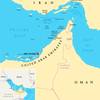Chinese ships are no longer at the disputed Scarborough Shoal in the South China Sea and Philippine boats can resume fishing, the Philippine defence minister said on Friday, calling the Chinese departure a "welcome development".
Philippine fishermen can access the shoal unimpeded for the first time in four years, Defence Secretary Delfin Lorenzana said, capping off a startling turnaround in ties since his country rattled China by challenging its maritime claims at an international tribunal.
The departure of the Chinese coast guard ships comes after President Rodrigo Duterte's high-profile visit to Beijing and his repeated requests for China to end its blockade of the shoal, a tranquil lagoon rich in fish stocks.
"Since three days ago there are no longer Chinese ships, coast guard or navy, in the Scarborough area," Lorenzana told reporters.
"If the Chinese ships have left, then it means our fishermen can resume fishing in the area."
Though the Scarborough Shoal is comprised of only a few rocks poking above the sea some 124 nautical miles off the Philippine mainland, it is symbolic of Manila's efforts to assert its maritime sovereignty claims.
Lorenzana did not explain the circumstances of the Chinese pullout from the shoal, the centrepiece of a case Manila filed in 2013 at the Permanent Court of Arbitration in the Hague that was decided in Manila's favour on July 12.
And there was some confusion about the situation at sea, with a Philippine military spokesman earlier saying Chinese vessels were "still there". Some fishermen familiar with the area said the same.
China's Foreign Ministry spokesman Lu Kang made no mention of a coast guard withdrawal when asked about the return of Philippine fishermen to the shoal.
The two countries "were able to work together on issues regarding the South China Sea and appropriately resolve disputes," Lu told a regular briefing.
The United States backed Manila's arbitration case as part of its effort to stand up to what it sees as China's "excessive" maritime claims, only to come under repeated verbal attack from Duterte recently. Washington said it was still assessing Lorenzana's comments on the Chinese moves.
"We hope it's certainly not a temporary measure," State Department spokesman Mark Toner told a regular news briefing.
"We'd like it to be a sign that China and the Philippines are moving towards an agreement on fishing access at Scarborough reef that would be in accordance with the July 12 arbitral decision."
Greg Poling, a South China Sea expert at Washington's Center for Strategic and International Studies think tank, said a Chinese pullout from Scarborough Shoal would be "a big deal, if it's true and if it's sustained."
"But there is a lot that is still unclear," he said.
"Is this a sign of a new status quo, whereby China will effectively comply with the arbitral award by allowing Filipino fishermen access to Scarborough?
"Or is it just an olive branch while the two sides haggle over language for a long-term deal, which might prove impossible to reach if Beijing insists on language suggesting it is 'permitting' or 'allowing' the Philippines access?'"
The Hague court declared that despite Scarborough Shoal being located within the Philippines' 200-nautical-mile exclusive economic zone, no one country had sovereign rights to it, so all claimants may fish there.
Peace Overtures
China has refused to recognise the case or the award, which also invalidated the nine-dash line on Chinese maps denoting its claims to most of the South China Sea.
China seized Scarborough Shoal - claimed by Beijing as Huangyan Island and by Manila as Panatag - in 2012.
The previous Philippines administration's pursuit of the case infuriated China, but Beijing appears to have changed its stance since Duterte took office and started praising Beijing, often in the same sentences as his perplexing verbal attacks on longtime ally the United States.
Reuters exclusively reported on the eve of Duterte's visit to China that Beijing would consider granting Philippine fishermen conditional access to the shoal.
An end to the standoff over the shoal is still a potentially combustible issue for both countries.
Some Philippine commentators say Manila may object to any reference to its fishermen being "permitted" to return, while Beijing might be wary of appearing to be softening its position on what it calls "indisputable" sovereignty.
Duterte's spokesman, Ernesto Abella, offered no comment on whether the two sides had reached agreement.
"All I can say, at this stage, it has been observed there are no longer Chinese coast guard in the area," he said.
China's Lu hailed Duterte's recent visit as a success and said both countries were able to discuss the South China Sea impasse.
"It is completely possible that the bilateral relationship can recover," Lu said.
"I can tell you that the two sides are in communication."
(By Manuel Mogato; Additional reporting by Sue-Lin Wong and David Brunnstrom; Writing by Martin Petty; Editing by Clarence Fernandez, Paul Simao and Lisa Shumaker)












